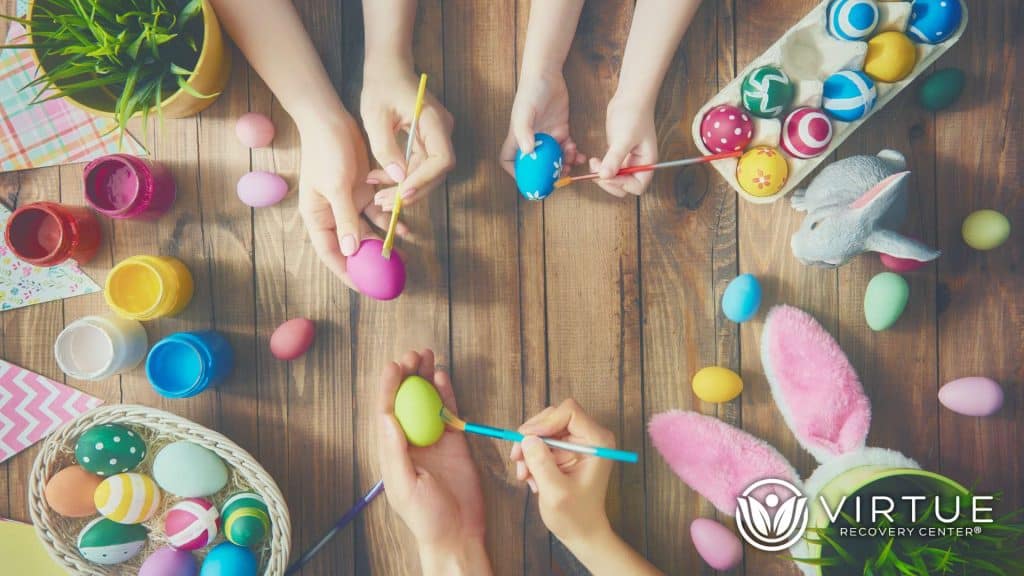Key Takeaways
- Easter symbolizes renewal and transformation, making it a perfect time to reflect on your recovery journey.
- Celebrating sobriety during the holidays can strengthen your commitment to a sober lifestyle.
- Avoiding triggers, maintaining routines, and relying on support systems can help prevent relapse.
- Spending time with loved ones and engaging in healthy activities can make Easter more meaningful.
- Professional addiction treatment and support groups guide lasting recovery.
Introduction
Easter is a holiday of renewal, hope, and fresh beginnings. For those in addiction recovery, it serves as a reminder that change is possible, and every day is an opportunity for growth. Just as Easter represents resurrection and transformation, your sobriety journey reflects your own rebirth into a healthier, happier life.
However, holidays can sometimes bring challenges and triggers. Family gatherings, social events, and past memories may test your commitment to sobriety. But with the right support system, self-awareness, and coping strategies, you can celebrate Easter with gratitude and confidence.
This article explores how Easter can be a powerful time for self-reflection, celebration, and renewed dedication to your recovery journey.
The Meaning of Easter in Recovery
A Time for Renewal and Transformation
Easter is about resurrection and renewal, both spiritually and personally. It is a time when people embrace change, healing, and new beginnings. For someone in recovery from addiction, Easter can symbolize:
- Letting go of past struggles and embracing a new future.
- Finding strength in your journey and recognizing personal growth.
- Understanding that transformation is possible, one day at a time.
If you’ve been struggling with substance use disorder, let this holiday remind you that you are capable of lasting recovery. Every step forward, no matter how small, is a step toward a brighter, healthier future.
Reflecting on Your Progress
Easter is a great time to look back on how far you’ve come. Consider asking yourself:
- What challenges have I overcome in my recovery journey?
- How has my life improved since choosing sobriety?
- What goals do I want to set for my future?
Taking time for self-reflection can boost motivation and gratitude, reminding you why staying sober and committed is worth it.
Ways to Celebrate Easter While Staying Sober
1. Spend Time with Loved Ones Who Support Your Recovery
Surrounding yourself with positive, supportive people is essential. Whether it’s family, close friends, or your support group, spending Easter with those who encourage your recovery can make the holiday more meaningful.
Some ideas for sober Easter activities include:
- Attending an Easter service or gathering.
- Hosting a substance-free Easter brunch with friends.
- Participating in a sober Easter event or group activity.
If someone you know is struggling with addiction, Easter can be a meaningful time to offer support and guidance.
2. Engage in Healthy and Uplifting Activities
Instead of dwelling on past habits that may trigger cravings, find new ways to celebrate Easter. Consider:
- Taking a walk in nature to reflect and practice mindfulness.
- Engaging in arts, crafts, or journaling to express gratitude.
- Volunteering at a local shelter or community event.
Staying active and engaged can help you feel fulfilled and connected during the holiday.
3. Maintain Your Recovery Routine
Sticking to your therapy, meetings, and healthy habits is essential during holidays. Skipping support group meetings or avoiding your therapist can increase the risk of relapse.
If Easter brings stress or emotional triggers, remind yourself:
- It’s okay to say no to situations that make you uncomfortable.
- Prioritizing your recovery is more important than social expectations.
- Reaching out to your sponsor or support system can help you stay grounded.
Consistency is key to lasting recovery.
Overcoming Triggers and Avoiding Relapse During Easter
1. Recognizing and Managing Triggers
Holidays can bring stress, nostalgia, or social pressure, which may trigger old habits. Common Easter-related triggers include:
- Family gatherings where alcohol is present.
- Memories of past celebrations involving substance use.
- Feeling lonely or disconnected from others.
To manage triggers, plan ahead:
- Attend a support group or therapy session before the holiday.
- Bring a sober friend or accountability partner to gatherings.
- Have a quick exit strategy if a situation becomes overwhelming.
2. Practicing Mindfulness and Self-Awareness
Mindfulness can help you stay present and in control of your emotions. If cravings arise, take a deep breath and remind yourself:
- You’ve worked hard to achieve sobriety.
- Temporary discomfort will pass.
- Your recovery is worth protecting.
Journaling, meditating, or walking can help you focus on your wellness.
3. Avoiding Risky Situations
Don’t be afraid to skip a setting that feels unsafe or uncomfortable. You are not obligated to attend events that jeopardize your sobriety. Instead, create new sober traditions that align with your values and recovery goals.
Finding Strength in Your Support System
1. Lean on Your Recovery Community
Connecting with your support group, therapist, or sponsor can make all the difference. Whether you’re attending AA, NA, or an addiction recovery center, staying engaged helps you:
- Stay accountable to your sobriety goals.
- Find encouragement from others on the same journey.
- Gain insight from people who understand your struggles.
If you’re struggling, reach out. You are not alone.
2. Offer Support to Others
Helping others in recovery can be a meaningful way to celebrate Easter. Consider:
- Checking in on a friend who may be struggling.
- Volunteering at a local rehab center.
- Sharing your story to inspire others.
Giving back strengthens your own commitment to recovery while making a positive impact.
Conclusion: Embrace Easter as a Time for Renewal in Your Recovery
Easter is a time of hope, renewal, and fresh beginnings—all of which align with your addiction recovery journey. By embracing healthy habits, staying connected to your support system, and avoiding triggers, you can celebrate this holiday with gratitude and strength.
If you or someone you love is struggling with addiction, help is available. Virtue Recovery Chandler provides comprehensive treatment programs to guide individuals toward lasting sobriety and healing.
FAQs About Celebrating Sobriety During Easter
Why is Easter a meaningful time for addiction recovery?
Easter represents renewal, healing, and transformation—themes that align with the journey of overcoming addiction. It’s a great opportunity to reflect, celebrate sobriety, and set new goals.
How can I celebrate Easter while staying sober?
Choose activities that support your recovery, such as spending time with sober loved ones, attending a support group, or engaging in healthy hobbies.
What should I do if I feel triggered during Easter?
Plan ahead by identifying triggers, practicing mindfulness, and reaching out to your support system. If a situation feels unsafe, it’s okay to remove yourself.
Where can I find addiction recovery support?
Virtue Recovery Chandler offers personalized addiction treatment programs. Call 866-338-5779 today to start the journey toward healing and sobriety.
How can celebrating Easter help in my addiction recovery journey?
Easter is a time to celebrate renewal, and it can serve as a profound reminder of your journey towards recovery. It symbolizes hope and the possibility of a fresh start, empowering individuals to rebuild their lives free from the use of alcohol and other substances.
What role does a recovery center play during the Easter season?
A recovery center can provide vital addiction support during the Easter season. Many centers organize events and activities focused on community, such as egg hunts, which can help foster a sense of belonging and support among individuals in recovery.
How can I maintain my sobriety during Easter celebrations?
It’s important to have a plan in place. Surround yourself with supportive brothers and sisters in recovery, and if you feel tempted, please reach out to us or your recovery center. Engaging in alternative activities that promote mental health can also help keep your sobriety at the forefront.
What are some strategies to deal with temptation during the holidays?
Strategies include avoiding environments that may lead to relapse, practicing mindfulness, and having a support system in place. Remember that recovery isn’t just about abstaining from alcohol; it’s about transforming your behavior and mindset towards healthier choices.
How can I use the spirit of Easter to rebuild my life?
Embrace the spirit of renewal by focusing on your goals and the positive changes you’ve made. Use this time to reflect on your journey and the steps you’ve taken towards recovery. This can transform your outlook and strengthen your commitment to sobriety.
What should I do if I feel my sobriety is at risk during Easter?
If you feel your sobriety is at risk, it’s crucial to take immediate action. Reach out to your recovery center or addiction support network for guidance. They can provide you with the tools and support needed to navigate through this challenging time.
How does Easter signify a time for personal transformation?
Easter signifies a time of personal transformation similar to your journey in recovery. Just as the season represents new beginnings, your recovery journey allows you to let go of past behaviors and embrace a healthier lifestyle.
Can participating in community events during Easter benefit my recovery?
Yes, participating in community events can greatly benefit your recovery. It fosters connections with others who share similar experiences, reinforces your commitment to sobriety, and provides a supportive environment to celebrate your progress.
What is a good first step to take if I want to start my journey towards recovery this Easter?
A good first step is to contact a recovery center for guidance. They can help you explore evidence-based practices and develop a personalized plan that empowers you to achieve lasting sobriety and rebuild your life.
Resources
https://www.webmd.com/mental-health/addiction/tips-stay-sober
https://nida.nih.gov/publications/drugs-brains-behavior-science-addiction/treatment-recovery
https://www.sciencedirect.com/topics/medicine-and-dentistry/sobriety







